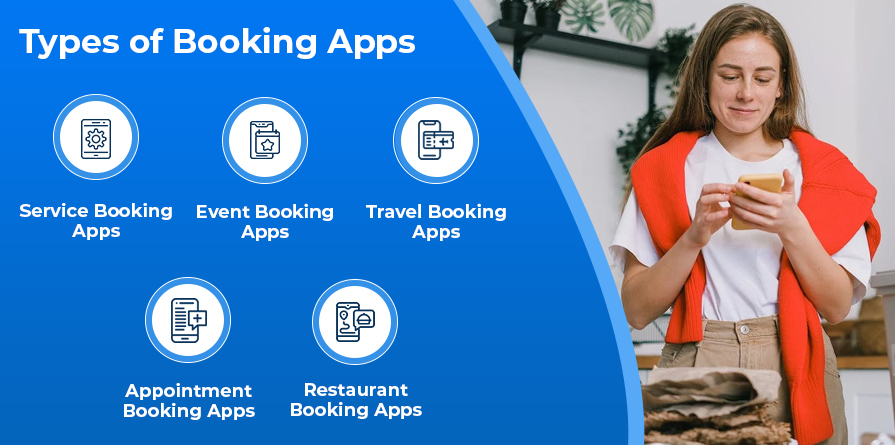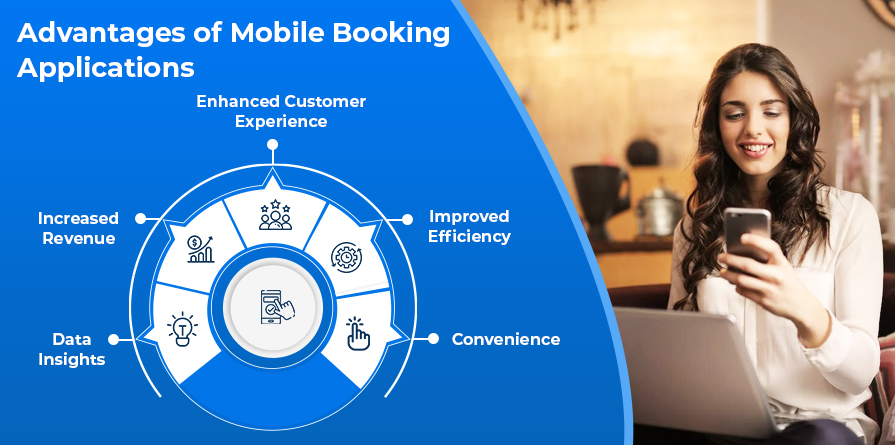How To Build A Booking Mobile App: A Complete Guide
People are increasingly relying on their mobile devices to make their lives easier. From ordering food to booking flights, mobile apps have become an essential part of our daily routine.
As a business owner, you can leverage this trend by creating a mobile app that allows your customers to book your services with ease. In this comprehensive guide, we will explore the step-by-step process of building a booking mobile app, including key features, design considerations, and development strategies.
Whether you are a small business owner or a large enterprise, this guide will provide you with the knowledge and tools you need to create a successful booking app for your business.
Key Features to Make a Booking App
- User Registration and Profile Management: Users should be able to register with the app and create a profile that includes their personal information, contact details, and payment information.
- Service or Appointment Booking: The app should allow users to browse and select services or appointments, view availability, and book appointments or services on specific dates and times.
- Payment Processing: The app should support secure payment processing for bookings, with the ability to accept multiple payment methods, including credit cards, debit cards, and mobile payments.
- Push Notifications and Reminders: The app should have the ability to send push notifications and reminders to users to confirm appointments or services, provide updates on booking status, or send promotional messages.
- Availability Calendar: The app should provide a visual representation of the business’s availability, allowing users to view available appointment slots or service times and book accordingly.
- User Reviews and Ratings: The app should allow users to leave reviews and ratings of services or appointments they have booked, helping other users make informed decisions and providing valuable feedback to the business.
- Loyalty Programs: The app should have the ability to offer loyalty programs or incentives to users who book services or appointments regularly, encouraging repeat business and increasing customer loyalty.
- Real-time Chat and Support: The app should provide real-time chat and support options, allowing users to ask questions, get assistance with booking or payment issues, and receive support in case of any problems or concerns.
- Analytics and Reporting: The app should provide analytics and reporting tools to track user behavior, booking patterns, and other key performance indicators, helping businesses make data-driven decisions and optimize their booking processes.
Things to consider when developing a booking app
- User Experience: One of the most important things to consider when developing a booking app is the user experience. The app should be intuitive, easy to navigate, and user-friendly, with clear instructions and feedback.
- Security: Security is a crucial consideration when developing a booking app. The app should use the latest security technologies, such as encryption and secure payment processing, to protect user data and transactions.
- Scalability: A booking app should be designed to scale with the growth of the business. Consider how the app will handle increasing numbers of users and bookings, and ensure that it can be easily updated and maintained.
- Integration with existing systems: If the business already has existing systems in place, such as a booking management system or payment processing system, the booking app should be designed to integrate with these systems to ensure seamless operations.
- Platform compatibility: The app should be designed to be compatible with multiple platforms, such as iOS and Android, to ensure that it can reach the widest possible audience.
- Analytics and Reporting: The app should be designed to provide analytics and reporting tools to track user behavior, booking patterns, and other key performance indicators. This data can be used to make data-driven decisions and optimize the booking process.
- Marketing and Promotion: Consider how the booking app will be marketed and promoted to attract new users and increase bookings. This may include social media marketing, targeted advertising, and referral programs.
- Ongoing Maintenance and Support: Once the booking app is launched, it’s important to provide ongoing maintenance and support to ensure that it remains up-to-date, secure, and user-friendly. This may include regular updates, bug fixes, and user support.
Important Types of Booking Apps
“Important types of booking apps” refers to the different categories or classifications of mobile applications that are designed to help users make bookings or reservations for various services or activities.
Some examples of major types of booking apps include:

- Travel booking apps: These apps are designed to help users book flights, hotels, rental cars, and other travel-related services.
- Event booking apps: These apps allow users to book tickets or reservations for concerts, sporting events, festivals, and other types of events.
- Restaurant booking apps: These apps enable users to make reservations at restaurants and sometimes also offer features such as menu browsing and online ordering.
- Appointment booking apps: These apps are designed to help users schedule appointments with healthcare providers, beauty salons, and other service providers.
- Service booking apps: These apps enable users to book services such as home cleaning, pet care, and handyman services.
Advantages of mobile booking applications

- Convenience: Mobile booking apps provide customers with the convenience of being able to book services or make reservations from their smartphones or tablets at any time and from anywhere. This means that customers can easily book appointments, services, or reservations even when they are on the go, without having to call or visit a physical location.
- Improved efficiency: With a mobile booking app, businesses can streamline their operations by automating booking and appointment scheduling processes. This saves time and reduces the likelihood of double bookings or errors. In addition, businesses can use the app to send automated reminders to customers, reducing no-shows and last-minute cancellations.
- Increased revenue: Mobile booking apps can help businesses generate more revenue by making it easier for customers to book services or make reservations. By providing a convenient, hassle-free way to book, customers are more likely to book services and spend more money than they would if they had to call or visit a physical location.
- Enhanced customer experience: Mobile booking apps can help businesses provide their customers with a better overall experience by giving them more control over the booking process. Customers can view availability, choose from multiple options, and easily reschedule or cancel bookings. This level of flexibility and convenience can lead to increased customer satisfaction and loyalty.
- Data insights: Mobile booking apps can provide businesses with valuable data insights, such as customer preferences, booking patterns, and service usage. This data can be used to optimize business operations, improve service offerings, and create targeted marketing campaigns.
Conclusion
Building a booking mobile app for your business is a great way to improve your customer’s experience and streamline your booking process. By following the steps outlined in this guide, you can create a successful booking app that meets the needs of your business and your customers.
It’s important to consider working with a reputable mobile app development company in USA to ensure that your app is designed and developed to the highest standards.
With the right development partner, you can create a top-quality booking app that will help your business succeed in today’s competitive marketplace.



